Off-the-shelf or custom-built?
That’s the primary question that business and startup owners ask themselves when choosing software for optimizing and automating their workflows.
Off-the-shelf solutions are quick to install and use. However, you never know whether it will perfectly suit your business processes or become a headache after the next update.
Custom software development is crafted to meet your business needs, addressing specific operational challenges and improving overall efficiency. Although it takes more time to develop, this approach is becoming the top choice for enterprises and startups of all sizes.
This article aims to guide you through the decision-making process, helping you make the right strategic choice for your business’s future.
At Rubyroid Labs, we’ve successfully completed over 150 projects for businesses of all sizes, from startups to enterprises. Our 5-star rating on Clutch.com and 45+ superior feedbacks show our deep understanding of our clients’ business requirements, interpreting their needs, and building solutions that exactly match their vision.
Reach out to us for an estimate on your custom software project. We’re ready to discuss your ideas and offer modern technological solutions that fit your business perfectly.
Contents
- Custom vs. Off-the-Shelf Software: Key Differences
- Top 7 Advantages of Custom Software Development
- Top 5 Disadvantages of Custom Software Development
- 4 Project Examples of Custom Software
- When Bespoke Software Development is The Right Choice
- Final Words
Custom vs. Off-the-Shelf Software: Key Differences
No matter what type of business you own, you need software if you have digital processes. The type of software you choose is up to you, but its key purpose should always be solving problems instead of creating them.
In this section, we’ll compare two solutions: custom software and off-the-shelf software.
Custom Software: Made for Your Needs
Imagine that custom software is like building your own house. You start with a blank slate and can design everything just the way you want—deciding how many rooms there are, where the kitchen goes, and whether the garage is attached or separate. Want a garden, a pool, or a BBQ area? You can make it fit your lifestyle.
Similarly, custom software development lets you add the features you need, tailored to your specific processes, workflows, and goals. You’re not stuck with a pre-made solution and can upgrade the software as your business grows. However, it does take time and resources to build.

Off-the-Shelf Software: Convenient and Ready, But Limited
On the other hand, off-the-shelf software is like moving into an apartment. There’s a kitchen, bathroom, a hall and two bedrooms. It’s ready to use straight away, but you’re limited in adding extra rooms. You can make changes inside, like knocking down walls, changing furniture, or painting, but you can’t do anything about the apartment’s size. Forget about a pool or a garden.
This type of software is simple to set up and less expensive initially. However, it may not be an ideal fit for your company. It is designed for a variety of enterprises, so it may include features you do not require while omitting others. As your business expands, you may discover that the software does not keep up.

Let’s have a look at the table with distinct differences between the two types of software.
| Aspect | Custom Software | Off-the-Shelf Software |
| Customization | Specifically crafted to fit individual business demands | Limited to predefined features and settings |
| Scalability | Grows with company, adjusting to new demands | Scaling could require costly add-ons |
| Initial Cost | Higher upfront cost due to development from scratch | Lower initial cost, but may incur ongoing fees |
| Time to Implement | Longer to build | Immediate availability |
| Maintenance & Support | Dedicated support and continuous updates based on needs | Vendor-dependent updates, often on a set schedule |
| Flexibility | Unlimited flexibility to shape every part of the software | Restricted customization options; most features are set |
| Long-Term Fit | Can adapt to changing company requirements | Risk of becoming obsolete if unable to match changing requirements |
Both types of software are popular and used by companies.
However, there’s a growing trend among company leaders to favor custom software development. And the reason is simple: bespoke programs enable independence from external parties.
With off-the-shelf solutions, the provider can make unexpected decisions without asking your permission, such as tripling the subscription cost, changing user policies or imposing useless services.
As a result, you may be forced to search for alternative software and reorganize the workflow, losing time and productivity.
By building custom software, you can avoid these issues. However, like any solution, bespoke software development comes with its own set of pros and cons. Let’s explore them in detail.
Top 7 Advantages of Custom Software Development
Custom software development is the chance to build a digital solution that will bring the company to the next level. Here are the most essential advantages of custom software development:
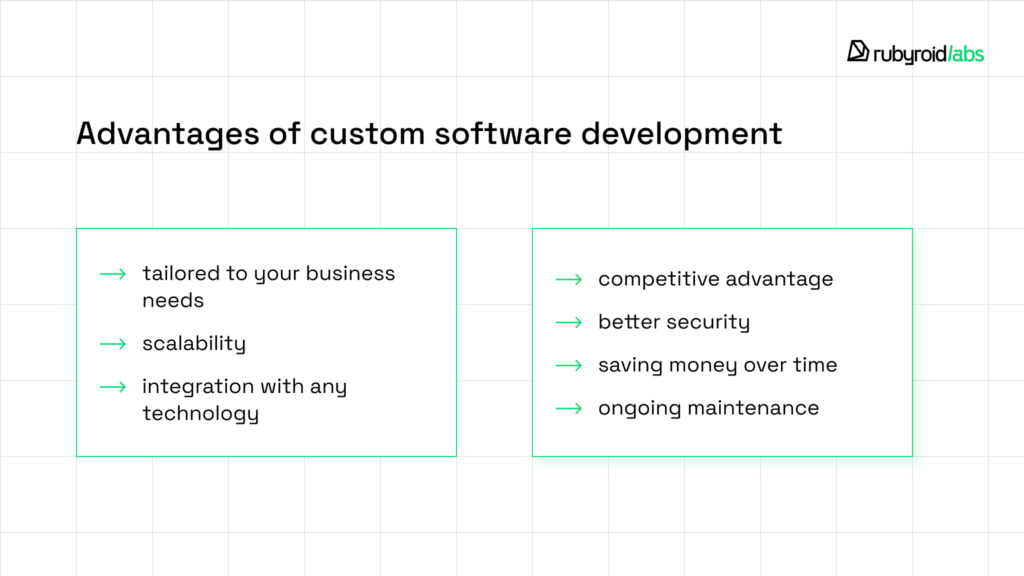
1. Tailored to your business needs
Bespoke software is designed specifically for your organization’s needs, matching your particular processes, goals, and issues. This specific approach guarantees that each function and capability is properly aligned with how your company functions, reducing wasted effort and money.
2. Scalability
Your customized software solution grows together with your business. Bespoke applications are designed with future expansion in mind, allowing you to add new features and functions as your business needs evolve and expand.
3. Integration with any technology
Tailored software solutions offer unparalleled compatibility with cutting-edge technologies that align perfectly with your business strategy. Whether you’re looking to harness the power of artificial intelligence, deploy conversational interfaces for better customer support, or boost system efficiency using modern programming languages such as Golang, the options are limitless. Your bespoke application can be continuously adapted to support your evolving business objectives.
4. Competitive advantage
With a custom software solution, your company enjoys a competitive advantage. This special digital toolkit allows you to improve customer service, provide personalized experiences, and increase operational efficiency. Such benefits frequently outperform competitors that rely on generic, off-the-shelf solutions.
5. Better security
Custom software is generally more secure as it’s designed with your specific security requirements. With comprehensive control over security standards, you may reduce possible flaws commonly encountered in mass-market apps. This personalized approach to cybersecurity considerably decreases the danger of attacks that frequently target widely distributed commercial software.
6. Saving money over time
While custom software often involves a larger initial expenditure, it frequently proves to be more cost-effective in the long term. There is no need for expensive licensing costs, and you will not be charged for features that are unneeded.
7. Ongoing maintenance
Having bespoke software, you don’t depend on a third-party provider for updates and maintenance. You can decide when and how to update your software, making sure it always fits your current needs.

Top 5 Disadvantages of Custom Software Development
Let’s be objective. Despite all its significant benefits, custom software is not without its challenges. Here are some of the most notable disadvantages:
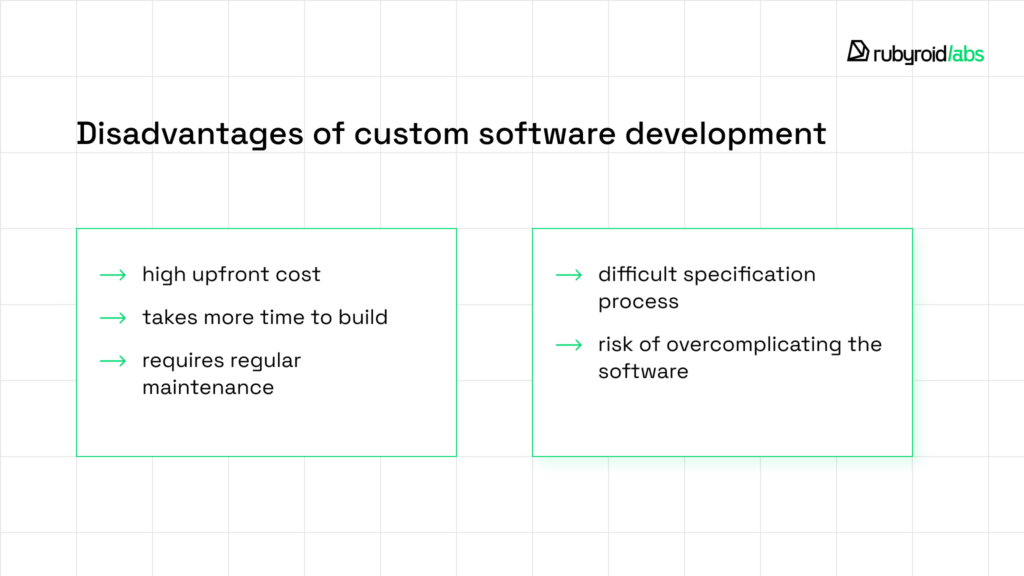
1. High upfront cost
Comparing custom software development with off-the-shelf solutions, the initial cost of the tailored application will be considerably higher. Hiring developers, designers, and project managers is always much higher than purchasing pre-made software.
2. Takes more time to build
Building custom software from scratch takes time. From planning and design to development and testing, the process can be lengthy, delaying the time it takes to start using the solution.
3. Requires regular maintenance
Unlike ready-made software, where the vendor handles maintenance and updates, custom software requires ongoing support, bug fixes, and updates to ensure it remains functional and secure.
4. Difficult specification process
Defining the exact specifications for your custom software can be a complex and time-consuming task. You need to ensure you thoroughly understand your business needs and communicate them effectively to the development team to avoid costly misunderstandings. If you’re struggling to formulate your needs, you can read our blog post where we share tips on how to present an app idea to a developer.
5. Risk of overcomplicating the software
There’s a risk of over-customization, where too many features are built into the software, making it unnecessarily complex and harder to use or maintain. This can lead to inefficiencies and higher long-term costs.
The cost and timeline depend on your goals and specific requirements. When it comes to avoiding overcomplicating the software and refining your project specifications, a reliable development company will guide you through both and advise on the best options.
4 Project Examples of Custom Software
From theory to practice, let’s examine the examples of custom software and how they empowered the businesses.
AI-powered Web application
Client request
A web app would help brokers and their clients understand insurance terms more easily, simplify tasks, and make employees work more efficiently, leading to better results for customers.
Solution
CoverageExpert is a comprehensive insurance database platform in the United States, with over 700 types of policies and over 33,000 coverage upgrades from top insurance providers. It serves as an invaluable resource for insurance professionals aiding their consumers.
Creating a custom ChatGPT-based chatbot helped users find information faster, which boosted their engagement and satisfaction.
By using and training the Gemini AI tool, the client was able to identify potential coverage improvements that could be added to standard insurance plans.
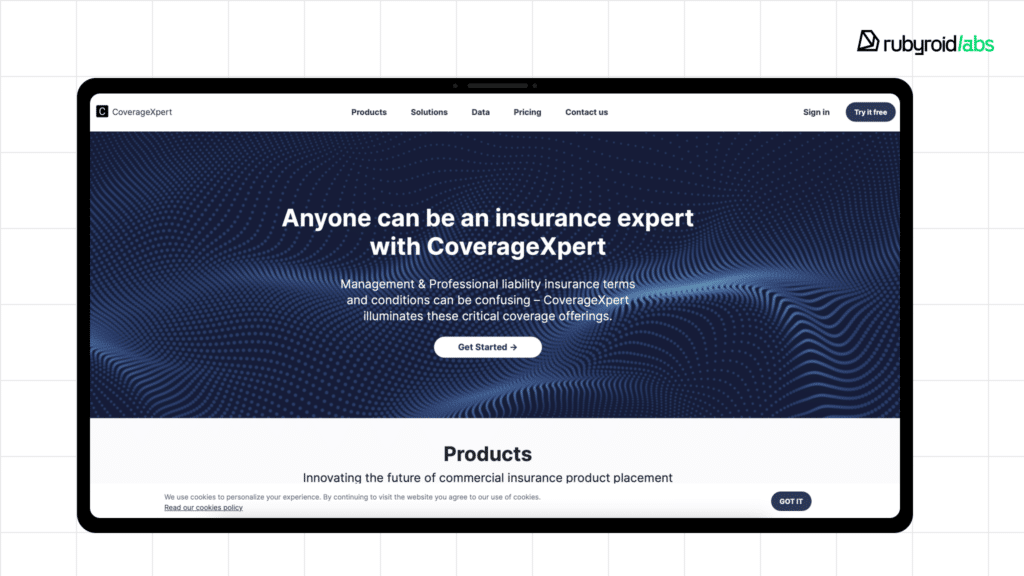
B2B Inventory System for Vehicle Dealers
Client request
A B2B platform needed to facilitate seamless information exchange between car dealers. The goal was to streamline vehicle management tasks, including inventory tracking and advanced search and filtering features.
Solution
NTN is a B2B inventory management system that allows auto dealers to quickly manage their inventory, search and filter vehicle listings, and access key insights for informed decision-making. Its user-friendly administrative interface makes it easier to handle automobile data and inventory across numerous dealerships.

Smart Fitness App for Monitoring Workout Intensity
Client request
The client requested a comprehensive platform. It needed to collect, process, and analyze the data from the company’s innovative wearable device used for measuring muscle oxygenation (SmO2) and nitric oxide (NO) levels during athletes’ training sessions.
Solution
The AI-powered platform includes both a web application and a mobile app. The built-in AI tool collects, processes, and saves individual data from the biosensor during workouts. After that, the AI assistant provides personalized advice to help users optimize their training for better health and performance.
NNOXX is a cutting-edge solution for the sports industry and has been adopted by major US sports leagues such as the NBA, MLB, NHL, and NFL. Fitness enthusiasts can also purchase it on Amazon.
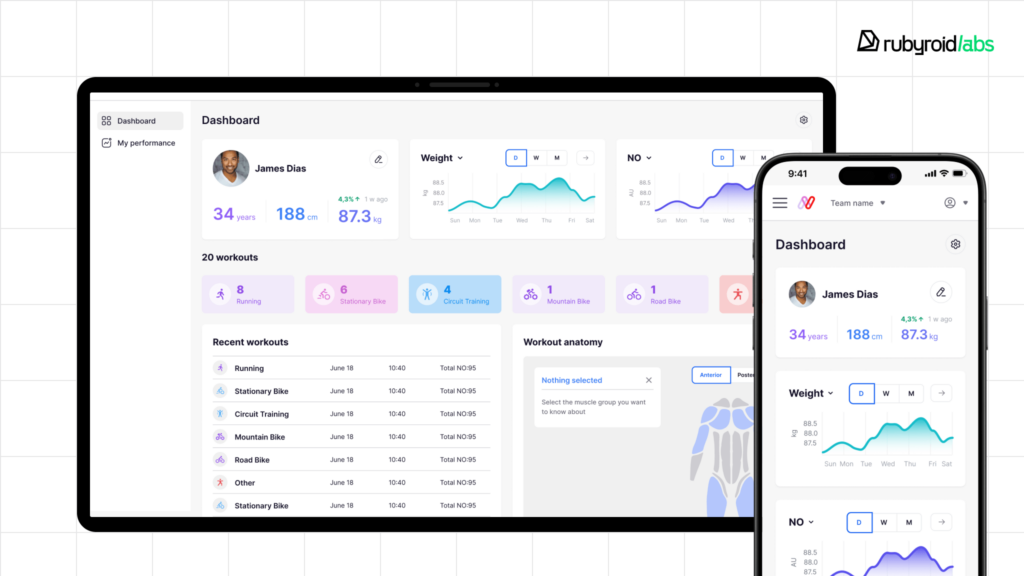
Custom CRM for Tour Operator
Client request
Sail Croatia, one of the top tour operators for Croatia in the UK and Ireland, needed a custom CRM system to reduce manual operations by automating routine tasks and allowing managers to deliver a better customer experience. Additionally, they required a mobile app to provide tour information to both managers and tourists in one convenient place.
Solution
Rubyroid Labs developed a custom CRM system and a mobile app tailored to Sail Croatia’s needs. The CRM system automated key processes such as tour booking management, boat allocation, and customer management, significantly reducing the manual workload for staff. The mobile app, available online and offline, allowed managers to access booking info, maps, directions, and excursion materials, while tourists could easily find all relevant tour details in one place.
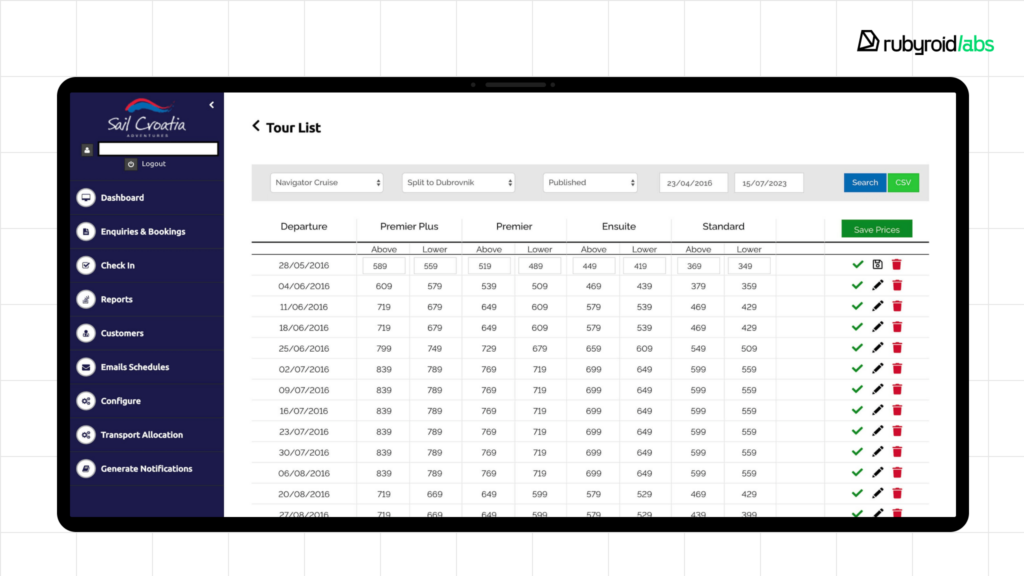
All these case studies were developed by our development team with over 8 years of experience working on projects across various industries, such as automotive, sports, finance, healthcare, e-commerce, and real estate.
Interested? Then study our portfolio and contact us to discuss your idea and get a project estimate including costs of all technologies and integrations.
When Bespoke Software Development is The Right Choice
The answer to this question always depends on your business’s particular characteristics, such as size, sphere, specific features, financial opportunities, and, of course, your will. Consider these criteria while weighing decisions whether to write custom software or use an off-the-shelf solution:
Specific Niche or Industry
The tailored-made software solution will hit the nail on the head if your business specializes in a narrow niche. In this case, off-the-shelf software will not meet the unique requirements of the business due to specialized workflow, terminology, and using special equipment.
Example: A truffle farm needs completely different inventory management compared to a typical retailer.
Unusual Internal Structure
Firms with irregular internal structures and complex business processes might require custom software to bring order and simplify the workflow for employees. If your company has a non-traditional hierarchy, cross-functional teams, or unique decision-making processes, you’ll likely need custom software. A ready-made solution will struggle to meet your specialized setup.
Example: A multinational corporation with a matrix management structure needs a tailored human resources system to manage complicated channels of reporting and project assignments.
Startups with Innovative Ideas
Startups usually thrive in an untapped area, providing goods or services that may not fit neatly into traditional business models. In such cases, off-the-shelf software may not be enough to support their creative processes or novel business methods.
Bespoke software can offer more flexibility to implement unconventional ideas, adapt quickly to market feedback, and help scale faster as the startups grow.
Example: A startup creating a blockchain-based supply chain verification system for the fashion industry.
Integration of Legacy Systems
There are businesses in industries such as banking, insurance, or manufacturing that rely on legacy systems—essential but outdated. As these systems normally contain vast amounts of important data, the best option is to modernize the processes with new technologies rather than fully replacing them. Out-of-the-box software rarely makes sense in these cases, as it lacks the necessary flexibility.
This is where custom software development acts as a bridge between old and new technologies, preserving the investment in legacy systems while transitioning to more modern, efficient solutions.
Example: A bank needs to incorporate its 1980s mainframe system with current cloud-based solutions.
Highly Regulated Industries
Industries such as healthcare, aviation, finance, education or food services have strict compliance requirements that must be met. These sectors work under intense control from government agencies and regulatory bodies and need to comply with complex rules regarding data handling, privacy, security, and operational procedures. Custom software allows organizations in regulated industries to build compliance directly into their processes, ensuring that every action and transaction meets regulatory standards.
Example: A healthcare provider has started building a patient management system that is entirely compliant with HIPAA standards.
Apart from all the criteria above, you can build custom software just for making your business more agile, modern, and competitive.
Final Words
For sure, your business idea has great potential for growth. Whether you’re just starting or already managing a well-established business, robust software can help you achieve your goals.
Be it off-the-shelf software or a custom-made solution, the final decision is yours, because no one knows your business needs, goals, customers, and possibilities better than you.
At Rubyroid Labs, we offer two key pieces of advice to help you make the right choice:
- If your company operates in a standard industry with commonly used services or products, prebuilt software is a good choice. This option is ideal if you need a quick setup, lower upfront costs, and don’t require extensive customization. It suits businesses with general needs where existing, ready-made solutions can fulfill them.
- Choose bespoke software development if your company has unique processes, requires specific features or needs to scale with flexibility. Custom solutions are ideal if you want full control over your software, plan to build tailored functionality, or aim to grow beyond the limitations of prebuilt products.
If you’re interested in creating custom software and eager to explore technologies that can enhance your business processes—whether through AI integration, cloud solutions, or microservices—we’re here to help. Contact us for expert custom software development services and take the first step toward building a solution that is truly your own.




